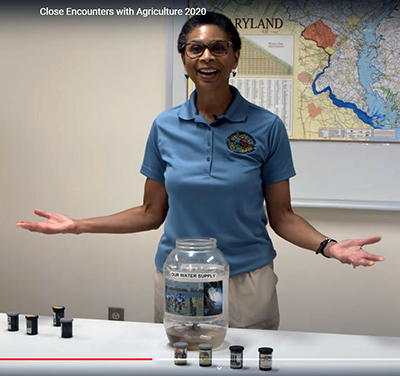UME senior agent Wanda MacLachlan helps thousands of people connect to the land through horticulture
Wanda MacLachlan was a city kid who grew up in a row house in Baltimore coaxing vegetables out of raised beds in her family’s tiny backyard. Her parents both worked in computer fields during a time when a computer was a machine that filled an entire room. MacLachlan’s life could easily have gone in a million different directions that had nothing to do with gardening, farming or waterways stewardship.
But as she tended to that tiny garden, MacLachlan sowed a love for horticulture that would carry her through more than 30 years of inspiring others to care for their land and the waterways it feeds into.
MacLachlan is a senior agent with the University of Maryland Extension Field Operations. Among her many achievements, MacLachlan created the Bay-Wise Landscape Management Program, which trains Master Gardener volunteers how to reduce pollution and sediment flowing from residential landscapes into the Chesapeake Bay watershed. Once certified, the master gardeners spread that information to homeowners in their communities.
Now in its 25th year, Bay-Wise has trained more than 1,500 Master Gardeners and reached thousands of Marylanders through their efforts.
“It’s a wonderful feeling to know that something I developed so many years ago has lasted so long, and can have such an impact,” MacLachlan said.
MacLachlan began working for Extension as Baltimore City’s urban agriculture agent in 1984 and moved to Montgomery County to become the commercial horticulture agent in 1992. When she was asked to develop a program focused on the Chesapeake Bay in 1995, she found her calling.
“I knew there were issues with water quality in the Chesapeake Bay,” MacLachlan remembers, “And when I was put in the position of educating residents on how to protect the Bay, I knew I couldn’t do that all by myself. So, I thought, Master Gardeners could help multiply my effort.”
MacLachlan’s train-the-trainer approach has become a model for other citizen-based, environmental programs such as the Watershed Steward Academy, Maryland Woodland Stewards Project, and the new Delmarva Woodland Stewards Program, a partnership with UME, the Maryland Forest Service and public and private partners across the Delmarva peninsula.
MacLachlan also developed the Master Naturalist Program in 2010. The science-based program, which uses classroom and field experiences to teach about regional ecology, has prepared 1,756 Marylanders to contribute nearly 200,000 hours of meaningful volunteer work in environmental restoration projects, education, public awareness campaigns, and field research.

And adults are not MacLachlan’s only audience. Since 1993, she has been teaching fourth graders about the connection between the land, water quality and the food they eat through the horticulture component of Close Encounters with Agriculture. The program hosts school children for daylong visits at the Agricultural History Farm Park in Derwood, Maryland. Every year, nearly 4,000 children come to learn about livestock, crops, nutrition, and the environment. MacLachlan now sees some of the first children she taught returning as adults to shepherd their own kids through a day at the farm.
“That has been fun to see,” MacLachlan said. “And really it is so important for these kids to be exposed to where their food comes from and its connection to the land. If they’re not exposed to it, they don’t know.”
MacLachlan says she experienced a similar broadening of horizons when she was child and her family left Baltimore City on visits to their summer home in St. Mary’s County, Maryland.
“My mom grew a vegetable garden down there, and I can remember going down into the woods to dig up humus,” MacLachlan recalled. “We would bring it up to the garden and turn it into the clay soil. I think that’s probably where I first got my start in gardening and connecting to the land.”
During college, MacLachlan’s horizons were broadened once more, when she set off for Kansas, the grain belt of the country and a world away from Baltimore. She had already completed a year at St. Mary’s College where she had a full academic scholarship. But MacLachlan wanted to run track, and St. Mary’s had no track team. So, she left the scholarship behind and entered Kansas State University where she joined the track team as a walk-on. That next year, MacLachlan earned an athletic scholarship and went on to win All American in both the indoor 600-meter race and the outdoor 2-mile relay race.
After earning her bachelor’s degree in horticulture, MacLachlan returned to Maryland and earned her master’s in horticulture at UMD. When she was hired by UMD, she became the first black, female, agriculture extension agent in Maryland. Extension is still a dominantly white field, but during her long career, MacLachlan has been encouraged to see an increase in diversity.
“I am so happy to see more African American young people entering this field,” she said, noting that for a black person, going out into the field to collect data or conduct studies can still feel a little unsafe sometimes, especially in areas where there are not a lot of people of color.
MacLachlan added that she looks forward to the day when it is commonplace to see African American naturalists collecting data in the forest without fear that their presence draws suspicion.
“Despite that, you have to start somewhere,” she said, “and it’s good to see that we are represented.”